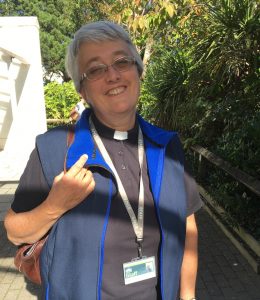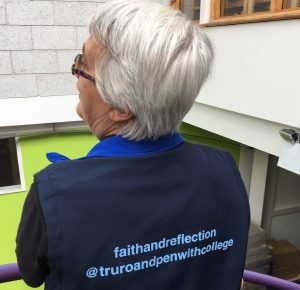Young people, pressure and how a college chaplain can make a difference
 Young people are under enormous pressure from all directions. Exams and the narrowing pathways to achieve them; sexuality and the confusing pressure to conform; how to look, how to behave and how to navigate a world that offers a lot of scary ways to fit in.
Young people are under enormous pressure from all directions. Exams and the narrowing pathways to achieve them; sexuality and the confusing pressure to conform; how to look, how to behave and how to navigate a world that offers a lot of scary ways to fit in.
The truth is, too many of our children and young people are unhappy, depressed and self-harming. That’s not anecdotal, that’s factual.
The truth is, too many of our children and young people are unhappy, depressed and self-harming. That’s not anecdotal, that’s factual.
Children’s Society Report should make us all ask – what can I do to help?
The Children’s Society produce a report every year on the emotional well-being of our children and the most recent should make every church member sit up and ask themselves, what can I do to help?
The key findings highlighted the unhappiness of young people pressurised to fit in with society’s expectations, the impact of the unending barrage of comments from social media, the damage of outdated gender stereotyping and the worrying rise in self-harming, particularly amongst 14 year old girls.
How do we respond? It’s no secret that going to church would not be a feature on many young people’s Instagram story, but that doesn’t mean we ignore what’s going on.
It’s no secret that going to church would not be a feature on many young people’s Instagram story, but that doesn’t mean we ignore what’s going on.
In Cornwall we have some of the best coverage of Open the Book teams for primary aged children in the UK, which is really positive. But, as primary becomes secondary school, these messages often dissolve. In their place grows the perception of a church that is out of step and not just irrelevant, but judgemental and harmful.
Across the Diocese in Cornwall there are some great initiatives and some very passionate clergy reaching out and into the places where young people are. Not to evangelise, but to connect and let them know that they are there and that support will always be available. One such initiative is the chaplaincy at Truro College.

Revd Elly Sheard, Chaplain at Truro College
How can a college chaplain make a difference?
Revd Elly Sheard took up the role last year in partnership with Methodist colleagues and considers their position unique, “Who wouldn’t want to have the potential to reach over 5,000 16-18 year olds in Cornwall?” But, despite walking amongst them and making themselves a very visible presence, the young remain hard to reach.
“On a practical level, they have little free time,” explains Elly. “Most of them are bussed in and out and their days are very full. We have to think outside the box and meet them more informally through stalls, fairs and events, or when invited into classrooms to talk about topics on the curriculum in which religion plays a part.”
“The A Level classes are great fun – I find myself taking on the role of an apologist, explaining to the students that I don’t hold the beliefs they think I do. There is more time to listen and challenge prejudices and misconceptions.”
One of the most disturbing findings that Elly discovered chimes with the Children’s Society findings. “We organised a prayer request box and received a few responses. Remarkably, not one of them was a prayer request for anyone who was ill, hurting or in need.”
Sin and shame are high up on young people’s perception of what church, or God, is all about
Elly believes that sin and shame are high up on young people’s perception of what they think the church, or God, is interested in. “It makes you think about what we’re saying out there.”
One of the reasons Elly and her colleagues take on the role of college chaplain is to try to key into this negative thinking. They encourage a reflective approach and try to prompt the young people to do some vital thinking, “They’re changing, rebelling, taking things on for themselves. If we can speak into that space somehow and suggest, however subconsciously, that the good, the right, the just and the kind are all worth working for, then that’s a good reason to be here.”
“They’re changing, rebelling, taking things on for themselves. If we can speak into that space somehow and suggest, however subconsciously, that the good, the right, the just and the kind are all worth working for, then that’s a good reason to be here.”
Elly explained how a quiz she ran during the equality, diversity and inclusion fair was really helpful on a subliminal level, “It was more a case of, here’s a church person and they don’t hate me because I’m gay. That’s a really big issue for a lot of the young people. I don’t have to go and tell him or her that, it’s just in the body language, the way you deal with people. That might be as much as we ever do, but that’s certainly worth doing.”
“It was more a case of, here’s a church person and they don’t hate me because I’m gay. That’s a really big issue for a lot of the young people. I don’t have to go and tell him or her that, it’s just in the body language, the way you deal with people. That might be as much as we ever do, but that’s certainly worth doing.”
Listening without judging is a witness in itself

Elly is visible, accessible and approachable around the college
Being a college chaplain is a bit like being an Angel at Boardmasters, in that the chaplains are trying to reach the students with a Christian ethos, rather than a Christian message. “I don’t tell young people what they should believe, that’s up to them to make their own minds up. I have no problem telling them my beliefs, but what I really want them to take away is the truth that God is interested in them, but not in a judgemental way.”
“What I really want them to take away is the truth that God is interested in them, but not in a judgemental way.”
Emma Seward-Adams, Head of Truro College Student Support agrees, “Right from the beginning, having the chaplains’ presence here has made a real impact.” She explained how they were careful from the start to explore the campus to find the areas the young people may be in and that may not be noticed – social areas, refectories, grounds etc – and to get know where they might go outside of lessons. This means the college chaplains can engage with the students and perhaps start a conversation that they may feel unable to have in a more formal setting.
“They pick people up with just a smile and can see if people are in distress, which is really helpful. It’s so important to have additional friendly faces around to add to the team approach we have to supporting young people. The visible symbol of faith, the dog collar in Elly’s case, draws students (and staff) in as they know she is a safe person to talk to, to touch base with. We’re absolutely delighted.”
Elly believes it’s really important to be visible and happy, up-beat and encouraging, and, as she says, “Listening without judging is a witness in itself.” Wise words indeed.





